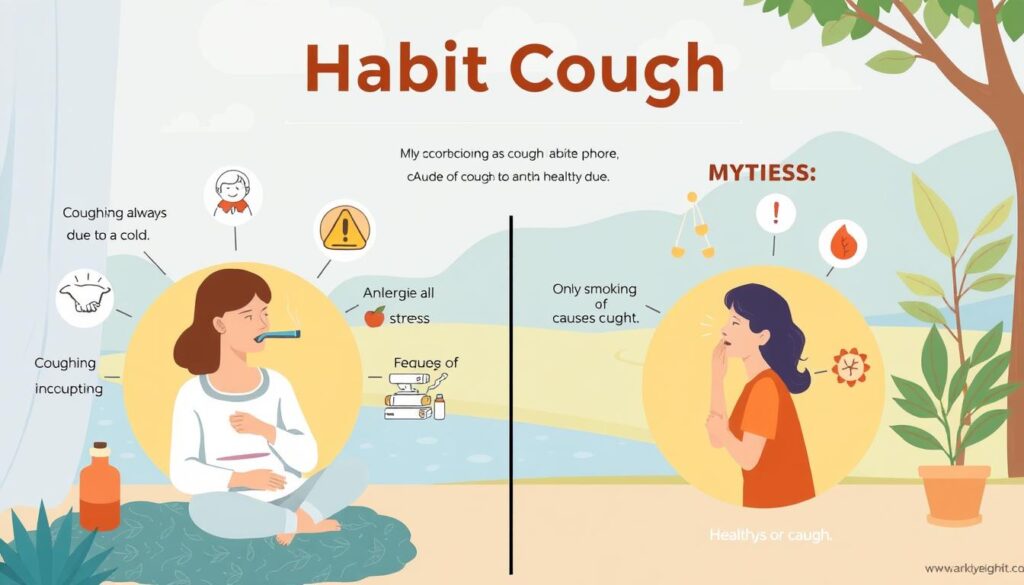Having a persistent cough can be really tough. Habit cough in adults is different from usual breathing problems. It affects how well you live and do things every day. This guide will help you understand and deal with chronic cough better.
Many adults have a cough that doesn’t seem to have a reason. Unlike coughs from colds, habit cough is hard to stop. We’ll look into how to manage it, both physically and mentally. You’ll find helpful tips to fight this tough condition.
Key Takeaways
- Habit cough is a complex condition affecting adult respiratory health
- Persistent cough can significantly impact daily life and well-being
- Effective treatment requires a multifaceted approach
- Understanding triggers is crucial for successful cough management
- Professional medical guidance can provide targeted relief strategies
Page Contents
- Understanding Habit Cough: Definition and Characteristics
- The Psychology Behind Habit Cough in Adults
- How to Treat Habit Cough in Adults
- Natural Remedies and Self-Help Techniques
- Medical Diagnosis Process and Professional Help
- Impact of Habit Cough on Daily Life
- Prevention Strategies and Long-term Management
- Common Misconceptions About Habit Cough
- Success Stories and Treatment Outcomes
- Conclusion
- FAQs
Understanding Habit Cough: Definition and Characteristics
Habit cough is a special respiratory issue. It’s not like coughs caused by being sick. This cough is more about habits, linked to our minds or nerves.
People with habit cough often can’t stop coughing. It’s like their body is doing it on its own. This can really mess up their day, making them feel awkward and upset.
Key Symptoms of Habit Cough
- Repetitive, dry cough without clear medical cause
- Cough that disappears during sleep
- No signs of respiratory infection
- Cough that intensifies during stress or anxiety
Distinguishing Habit Cough from Other Types
| Cough Type | Key Characteristics | Duration |
|---|---|---|
| Habit Cough | Psychological origin, no physical trigger | Weeks to months |
| Viral Cough | Infection-related, productive mucus | 7-10 days |
| Allergic Cough | Triggered by environmental allergens | Seasonal or continuous |
Common Triggers and Patterns
Things that make habit cough happen often have to do with feelings. Stress, worry, and certain situations can make it worse. Knowing this helps find ways to manage it better.
“Understanding habit cough requires a holistic approach that considers both physiological and psychological factors.” – Respiratory Health Experts
The Psychology Behind Habit Cough in Adults
Psychogenic cough is a mix of mental health and physical symptoms. It shows how our feelings can affect our breathing. Stress can make us cough more.
Anxiety and coughing are closely linked. Doctors now see how our mind can make us cough a lot. This cough doesn’t always have a clear reason.
“The mind and body are intricately linked, and our emotional state can significantly influence physical responses,” says Dr. Sarah Reynolds, clinical psychologist specializing in psychosomatic disorders.
- Psychological triggers often include:
- High stress environments
- Unresolved emotional trauma
- Chronic anxiety disorders
- Depression and emotional suppression
To understand habit cough, we need to look at everything together. Studies show that long emotional stress can lead to coughing. This cough is a way our body tries to cope.
Brain studies show that stress can start a cycle. Anxiety makes us cough, and coughing makes us more anxious. This cycle is hard to break.
How to Treat Habit Cough in Adults
Fixing habit cough needs a mix of doctor help, behavior changes, and lifestyle tweaks. It’s about finding what causes it and stopping it. This way, we can stop the coughing cycle.
Medical Interventions
First, doctors check you out. They might give you medicine to help:
- Medicines to make coughing less
- Medicines for nerves to calm down
- Special treatments to stop coughing
Behavioral Therapy Approaches
Stopping coughing is also about changing how you react. Here are some ways to do that:
- Talking therapy to change thoughts
- Learning to relax and be mindful
- Doing breathing exercises
- Talking to a counselor about stress
Lifestyle Modifications
Changing your life can also help a lot. Here are some tips to cut down on coughing:
- Ways to lower stress
- Getting better sleep
- Drinking more water and eating right
- Exercising regularly
Every person is different. So, treatment plans are made just for you. It’s a mix of doctor advice, behavior changes, and lifestyle tweaks.
Natural Remedies and Self-Help Techniques
Managing habit cough doesn’t always need a doctor. Natural remedies and home treatments can help a lot. They are good for adults with a chronic cough.

Start by knowing what makes your cough worse. Then, use natural ways to help. Herbal treatments are great for stopping the cough cycle.
- Hydration techniques to soothe throat irritation
- Breathing exercises to control cough reflexes
- Stress reduction methods
- Natural herbal supplements
“The power of natural healing lies in understanding your body’s unique response to environmental and emotional triggers.”
Some herbs can really help with habit cough. Ginger, honey, and chamomile are good for your throat.
| Herbal Remedy | Benefits | Preparation Method |
|---|---|---|
| Ginger Tea | Reduces inflammation | Steep fresh ginger in hot water |
| Honey | Soothes throat, suppresses cough | Take 1-2 tablespoons directly |
| Chamomile | Calms nervous system | Brew as hot tea |
Using these natural remedies takes time and effort. Keep track of how you feel. See which ones work best for you.
Medical Diagnosis Process and Professional Help
Finding out why you have a persistent cough can be hard. Knowing when to see a doctor and what to expect is key for getting better.
Chronic coughs can really mess up your day. It’s important to know when to go to the doctor. Spotting the signs that mean you need help is the first step to feeling better.
When to Seek Medical Help for Cough
- Cough lasting more than 8 weeks
- Cough accompanied by fever or chest pain
- Coughing up blood
- Significant weight loss
- Difficulty breathing or wheezing
Common Diagnostic Tests for Persistent Cough
| Diagnostic Test | Purpose |
|---|---|
| Chest X-ray | Examine lung condition and rule out respiratory issues |
| Pulmonary Function Tests | Assess lung capacity and breathing performance |
| Allergy Tests | Identify potential allergic triggers |
| Acid Reflux Tests | Check for underlying gastrointestinal conditions |
Finding the Right Cough Specialist
Choosing the right doctor for your cough is very important. Doctors like pulmonologists, allergists, and ENT specialists are great for complex coughs.
“Early diagnosis and targeted treatment can significantly improve patient outcomes and quality of life.” – American Lung Association
Look for doctors who know a lot about chronic coughs. They should give you a detailed check-up and a treatment plan just for you.
Impact of Habit Cough on Daily Life
Living with a chronic cough changes daily life a lot. It’s not just about feeling sick. It affects almost everything in your life, from work to personal stuff.
“A chronic cough is not just a medical condition, but a complex social and emotional experience that can profoundly impact quality of life.”
People with habit cough often feel stressed. This stress makes them doubt themselves and feel uneasy around others. Work can be tough too. Coughing a lot can mess up meetings and hurt relationships.
- Reduced social confidence
- Professional performance interruptions
- Potential communication barriers
- Increased personal anxiety
Life with a chronic cough gets really tough. You might not sleep well, focus less, and have trouble with friends and family. This is because coughing keeps interrupting.
| Life Area | Impact Level | Potential Consequences |
|---|---|---|
| Professional | High | Reduced productivity, potential career limitations |
| Social | Moderate to High | Decreased social interactions, potential isolation |
| Personal Well-being | High | Increased stress, potential mental health challenges |
It’s important to know how a chronic cough affects you. This helps find ways to manage it better. We need to tackle both the physical and emotional sides of it.
Prevention Strategies and Long-term Management
Managing habit cough needs a big plan. It’s about making a supportive space and finding ways to lower stress. Knowing what causes coughs and how to avoid them is key.
Creating a Cough-Free Environment
It’s important to make a space where coughs don’t happen. Here are some steps to help:
- Keep the air clean with air purifiers
- Get rid of dust and allergens
- Keep humidity levels low to avoid irritation
- Use products that are safe for allergies
Stress Reduction for Cough Control
Stress makes coughs worse. Finding ways to manage stress can help a lot.
| Stress Management Technique | Potential Benefits |
|---|---|
| Meditation | Reduces anxiety and physical tension |
| Deep breathing exercises | Promotes relaxation and reduces cough triggers |
| Regular physical activity | Decreases stress and improves overall health |
Managing coughs for a long time needs time and a plan. Mix changes in the environment, stress relief, and advice from experts. This way, you can control cough symptoms better.
Common Misconceptions About Habit Cough

Habit cough myths can confuse people and stop them from getting help. Knowing the truth about chronic cough helps patients make better choices for their health.
Many adults think a persistent cough is just a simple cold. Let’s clear up some common myths about habit cough:
- Myth: Habit cough is just a voluntary behavior that can be stopped at will
- Myth: Habit cough is not a real medical condition
- Myth: Only children experience habit cough
- Myth: Medication is the only solution for habit cough
Chronic cough facts show habit cough is a complex issue. It comes from both mental and physical triggers. It needs a full treatment plan.
People often think they can just stop coughing by trying hard. But, research shows habit cough involves deep brain connections. These can’t be controlled just by wanting to stop.
- Fact: Habit cough is a recognized medical condition
- Fact: Multiple treatment strategies exist
- Fact: Psychological interventions can be effective
To fight these myths, we need to educate patients and get help from doctors. Knowing what causes habit cough helps people find the right treatment and feel better.
Success Stories and Treatment Outcomes
Habit cough recovery gives hope to many adults with persistent coughing. Real stories show how successful treatment can be. They inspire those looking for relief.
Patient Experiences That Inspire
People who beat persistent cough share amazing stories. Their experiences offer key insights into what works:
- Sarah, 42, cut down her habit cough with cognitive behavioral therapy
- Michael stopped chronic coughing by tackling his anxiety
- Emily used both medicine and stress management
Typical Recovery Timelines
Knowing what to expect is key for habit cough recovery. Recovery times vary, but most see big improvements in a few months.
| Treatment Approach | Average Recovery Duration | Success Rate |
|---|---|---|
| Behavioral Therapy | 3-6 months | 72% |
| Medical Intervention | 2-4 months | 65% |
| Integrated Treatment | 4-8 months | 85% |
“Overcoming persistent cough is possible with the right approach and support.” – Dr. Emily Richardson, Pulmonology Specialist
These stories show a clear message. Habit cough can be managed well with the right treatment and care.
Conclusion
Habit cough in adults is a complex issue. It needs a deep understanding and careful planning. A habit cough summary shows that treating it is more than just stopping the cough.
Doctors say treating it well means looking at both the mind and body. Finding what causes the cough and changing habits are key. People with this issue should see it as a challenge to overcome, not a problem.
Important things to know about treating a persistent cough include getting medical help. It’s also important to look at the mind and stay positive. Every person’s fight against habit cough is different, needing a plan that fits them.
Learning about your condition and working with doctors can help a lot. Staying committed to treatment plans is crucial. Remember, beating habit cough takes time, knowledge, and a whole-body approach to health.
FAQs
What exactly is a habit cough?
A habit cough is a cough that keeps coming back. It doesn’t go away even when you’re not sick anymore. It’s often caused by stress, anxiety, or habits we don’t even notice.
How can I tell if my cough is a habit cough?
A habit cough lasts a long time and doesn’t make mucus. It goes away when you sleep. It also gets worse when you’re stressed or upset.
Are habit coughs dangerous?
Habit coughs aren’t usually dangerous. But they can make you feel embarrassed and upset. They can also mess up your sleep.
What treatments are available for habit cough?
There are many ways to treat habit cough. You can try therapy, speech therapy, or relaxation techniques. Sometimes, doctors might give you medicine to help stop the cough.
Can stress really cause a persistent cough?
Yes, stress can make you cough a lot. It can turn emotional problems into physical symptoms like a cough. This cough can last a long time.
How long does a habit cough typically last?
Habit coughs can last for weeks or months. But with the right treatment, you can start feeling better in 4-8 weeks.
Are there any natural remedies that can help manage habit cough?
Yes, there are natural ways to help. Avoid too much caffeine and stress. Also, get enough sleep.
When should I see a doctor about my persistent cough?
See a doctor if your cough lasts more than 8 weeks. If it’s keeping you from doing daily things, or if you have chest pain or blood in your cough, go see a doctor right away.
Can children develop habit coughs?
Yes, kids can get habit coughs too. The treatment is similar. It involves finding out what triggers it and using behavioral therapy. Sometimes, a specialist is needed.
Is habit cough a form of anxiety?
Habit cough is not the same as anxiety. But it can be linked to it. It’s a complex issue where your mind and body are connected in a way that makes you cough a lot.

